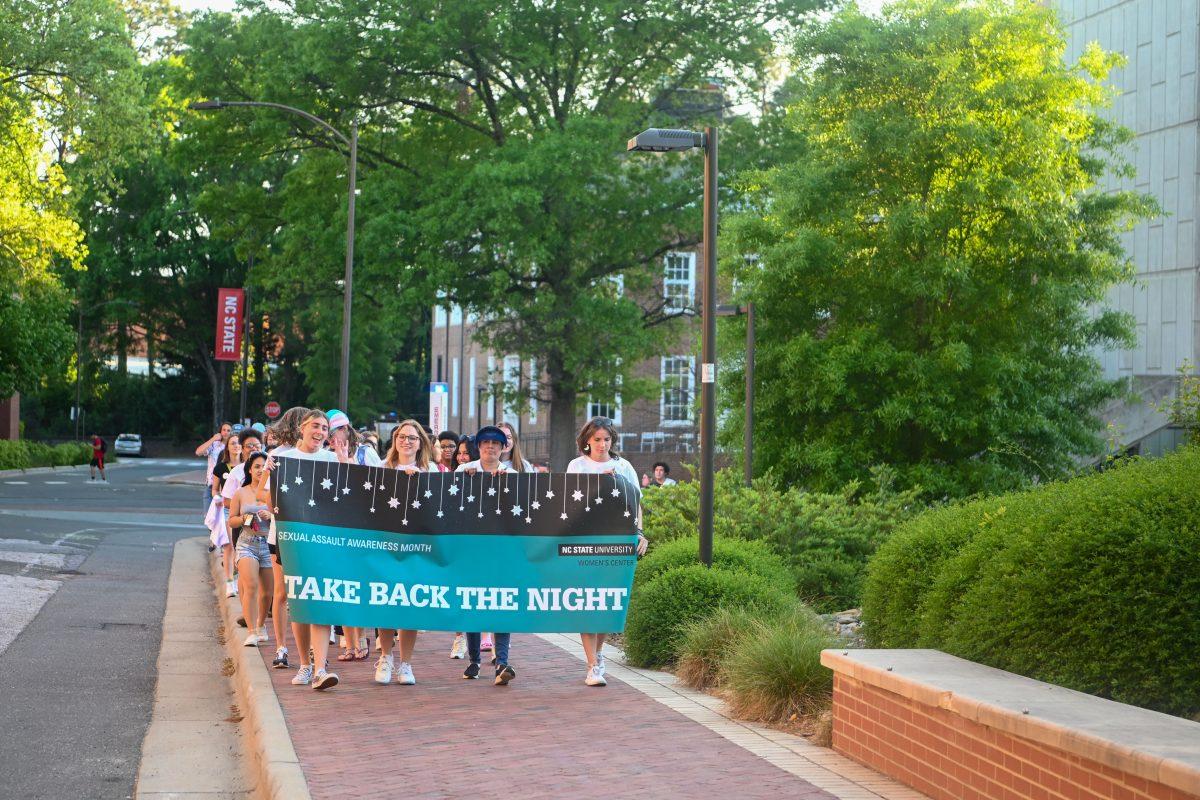Editor’s note: This article contains reference to sexual violence.
The Women’s Center and The Movement Peer Educators co-hosted the 36th annual Take Back The Night event at NC State Thursday, April 13.
Take Back The Night is an international nonprofit created to empower survivors and bring awareness to sexual violence. The campaign has seen hundreds of marches across the world in the last 50 years, with participants seeking to take back what has been taken from them because of sexual violence.
Dr. Kaelie Giffel, assistant director for interpersonal violence prevention, education and training, said the event has a historical place in NC State activism.
“We are taking part in a rich tradition of feminist activism at NC State, even though that feels difficult to access most days,” Giffel said. “Take Back The Night is one tool among many that has protested sexual, gendered violence. When we think about taking back the night, it’s not just about marching through the streets — though we will do that — it’s about taking back pleasure that has been stolen from us as a result of sexual violence.”
During the event, Giffel spoke to the student organizers of the Movement encouraging their continued against violence.
“I want to directly address myself to the Movement, who is a group of students that give me inspiration everyday to do my work even when I feel like I can’t do it anymore,” Giffel said. “I know that sometimes this work feels like it’s not enough in face of all of the evidence that sexual violence is increasing rather than decreasing against women of all positions. There is no solution to sexual violence except the daily act of showing up for each other and refusing to shut up about it.”
Giffel introduced student leaders of the Movement, a student-led advocacy and educational group spreading awareness on interpersonal violence. Fiona Prestemon, a fourth-year studying psychology and president of the Movement, and Mak Rink, a fourth-year studying communication and vice president of the Movement, gave a speech on the impacts of sexual violence, emphasizing that, for many, it begins as early as childhood.
“From childhood, we are raised to be seen, not heard,” Prestemon said. “We are taught to say yes, when we want to say no. We are forced to visit with an abuser, because his rights are more important than the rights of a child. We are catcalled and followed, beginning in elementary school. We are told that if a boy hits us, that means that he likes us. We learn that our bodies are not our own.”
Student Legal Services, Campus Health, the Counseling Center and others offered resources during the speeches. These campus entities offer immediate resources for those who have experienced assault. However, the Movement called out the hypocrisy of the narrative often given, even by University administrators.
“From college and beyond, we are taught how to move through space on guard and be hyper-aware of our surroundings,” Prestemon said. “We are told to walk in groups, especially at night. We are told not to be distracted by headphones or texting. … We are told that reporting is a good option, only to be disappointed by the reporting process.”
The event concluded with a march through campus, with marchers chanting “no more silence, no more violence.”
If you or someone you know is experiencing relationship violence, sexual violence, stalking or any other form of interpersonal violence and are in need of advocacy services, the NC State Women’s Center has trained advocates available to offer crisis intervention, emotional support, resources and referrals. Students can contact the 24/7 Sexual Assault Helpline at 919-515-4444 or email ncsuadvocate@ncsu.edu to schedule an appointment with an advocate.
Advocacy services through the NC State Women’s Center are available for all students inclusive of all gender identities and sexual orientations.
For more information on advocacy services, please visit go.ncsu.edu/supportsurvivors. If you would like to talk to a confidential resource, you can also connect with the NC State Counseling Center at 919-515-2423. You may also visit go.ncsu.edu/safe for additional information on resources and reporting options.














